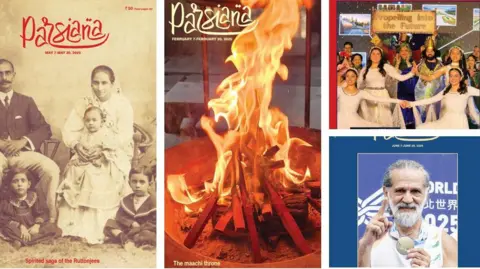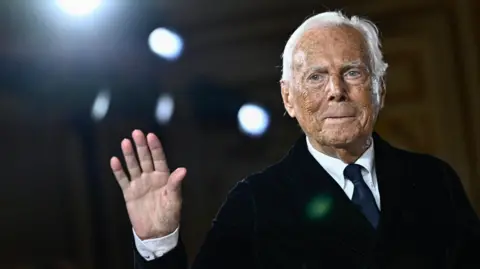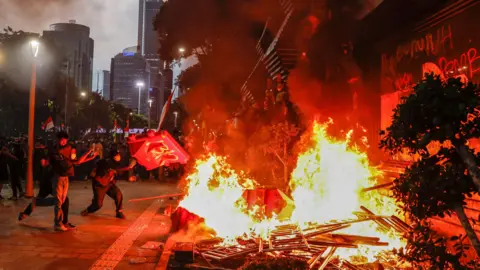---
Current time in Vatican City, April 22, 2025 - 1:06 a.m.
Pope Francis, renowned as the first Latin American leader of the Catholic Church, has passed away at the age of 88 following a stroke, striking a chord globally and leaving a palpable sense of loss among followers and leaders alike. The Vatican confirmed the announcement early Monday morning, describing in detail the medical circumstances leading to his death, including a cerebral stroke that resulted in a brief coma.
World leaders quickly reacted to the news, with many expounding on the profound impact Francis had during his 12 years of papacy, particularly advocating for marginalized communities and emphasizing social justice. President Donald Trump, known for his stark immigration policies, stated through social media that he and First Lady Melania Trump would attend the pope’s funeral, expressing eagerness to pay their respects. The Vatican's statement on the pope's passing reflected a somber recognition of his role: “At 7:35 this morning, the Bishop of Rome, Francis, returned to the house of the Father," according to Cardinal Kevin Farrell, who now acts as the Vatican's temporary administrator.
In the wake of his death, hundreds gathered in St. Peter's Square, mourning his loss with solemn prayers and candles. Many were captured by the suddenness of his passing, having recently seen him deliver an Easter blessing from his wheelchair just a day before. The pope's humble wishes for a burial—a simple tomb in Rome with the inscription "Franciscus"—was disclosed in his last will and testament, reflecting his steadfast dedication to humility even in death.
Across Latin America, tributes poured in highlighting Francis’ embrace of social issues such as climate change, migration, and indigenous rights. Brazil's President Luiz Inácio Lula da Silva remarked on his commitment to those in need and recognized the loss felt within the region, where the pope was seen as a representative figure. Yet, stark contrasts emerged in responses; while many celebrated his advocacy for the poor, some in Nicaragua criticized him for not taking a stronger stance against repressive regimes, expressing disappointment in his perceived lack of vocal support for political dissidents.
The confluence of his support for the LGBTQ+ community and traditional Catholic dogma structured a complex legacy that will provoke debate amongst the clerical and lay leadership as they consider a successor. The pope's efforts in combating clergy sexual abuse and financial mismanagement within the Vatican helped to reshape the church's interactions with its congregants, though parts of the conservative wing of the church remained vehemently opposed to his progressive views.
Spontaneous gatherings to honor the former pontiff took place in Buenos Aires, where many mourners expressed personal connections to their former archbishop. Messages of remembrance articulated feelings of personal loss, as a respect for his pastoral style vividly echoed throughout his home country, further complicated by mixed emotions around his political comments which some thought should have been more neutral.
Meanwhile, as the funeral arrangements are made, the question arises about the direction of the Catholic Church moving forward: Will it continue along the lines that Pope Francis charted, or pivot back to more traditional doctrines? In this time of mourning, both followers and critics of the pope are encouraged to reflect on his many teachings, with hope that his successors will either uphold or redefine his vision for the Church in a rapidly changing world.
Current time in Vatican City, April 22, 2025 - 1:06 a.m.
Pope Francis, renowned as the first Latin American leader of the Catholic Church, has passed away at the age of 88 following a stroke, striking a chord globally and leaving a palpable sense of loss among followers and leaders alike. The Vatican confirmed the announcement early Monday morning, describing in detail the medical circumstances leading to his death, including a cerebral stroke that resulted in a brief coma.
World leaders quickly reacted to the news, with many expounding on the profound impact Francis had during his 12 years of papacy, particularly advocating for marginalized communities and emphasizing social justice. President Donald Trump, known for his stark immigration policies, stated through social media that he and First Lady Melania Trump would attend the pope’s funeral, expressing eagerness to pay their respects. The Vatican's statement on the pope's passing reflected a somber recognition of his role: “At 7:35 this morning, the Bishop of Rome, Francis, returned to the house of the Father," according to Cardinal Kevin Farrell, who now acts as the Vatican's temporary administrator.
In the wake of his death, hundreds gathered in St. Peter's Square, mourning his loss with solemn prayers and candles. Many were captured by the suddenness of his passing, having recently seen him deliver an Easter blessing from his wheelchair just a day before. The pope's humble wishes for a burial—a simple tomb in Rome with the inscription "Franciscus"—was disclosed in his last will and testament, reflecting his steadfast dedication to humility even in death.
Across Latin America, tributes poured in highlighting Francis’ embrace of social issues such as climate change, migration, and indigenous rights. Brazil's President Luiz Inácio Lula da Silva remarked on his commitment to those in need and recognized the loss felt within the region, where the pope was seen as a representative figure. Yet, stark contrasts emerged in responses; while many celebrated his advocacy for the poor, some in Nicaragua criticized him for not taking a stronger stance against repressive regimes, expressing disappointment in his perceived lack of vocal support for political dissidents.
The confluence of his support for the LGBTQ+ community and traditional Catholic dogma structured a complex legacy that will provoke debate amongst the clerical and lay leadership as they consider a successor. The pope's efforts in combating clergy sexual abuse and financial mismanagement within the Vatican helped to reshape the church's interactions with its congregants, though parts of the conservative wing of the church remained vehemently opposed to his progressive views.
Spontaneous gatherings to honor the former pontiff took place in Buenos Aires, where many mourners expressed personal connections to their former archbishop. Messages of remembrance articulated feelings of personal loss, as a respect for his pastoral style vividly echoed throughout his home country, further complicated by mixed emotions around his political comments which some thought should have been more neutral.
Meanwhile, as the funeral arrangements are made, the question arises about the direction of the Catholic Church moving forward: Will it continue along the lines that Pope Francis charted, or pivot back to more traditional doctrines? In this time of mourning, both followers and critics of the pope are encouraged to reflect on his many teachings, with hope that his successors will either uphold or redefine his vision for the Church in a rapidly changing world.






















